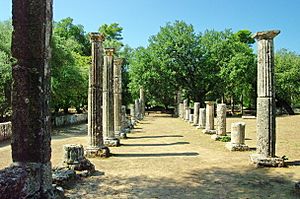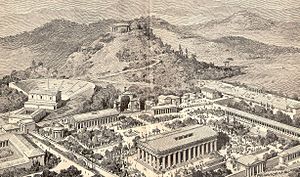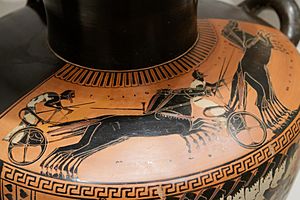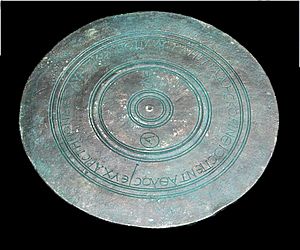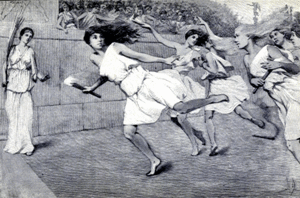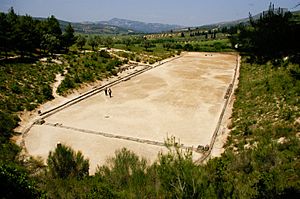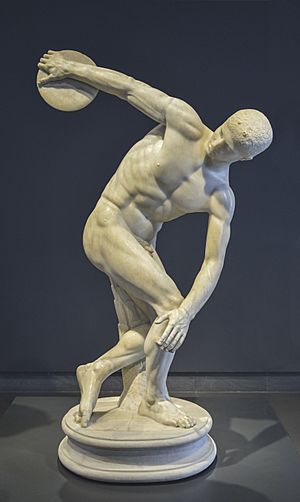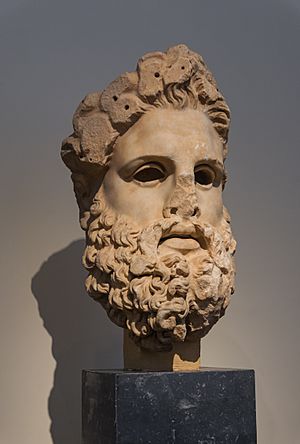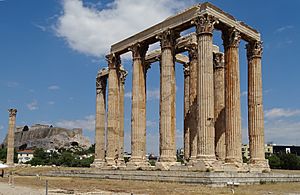Ancient Olympic Games facts for kids
The ancient Olympic Games were a huge festival and celebration for the Greek god Zeus. They started with just a few events like running, javelin throwing, and wrestling. These games were a series of sports contests between different city-states (like small countries) in ancient Greece. They were part of bigger events called the Panhellenic Games.
The first Olympic Games are believed to have happened in 776 BC. They continued even when Greece became part of the Roman Empire. But in AD 393, the Roman emperor Theodosius I stopped them. He wanted Christianity to be the main religion of Rome.
The games happened every four years. This four-year period was called an Olympiad. People in ancient times used the Olympiad to keep track of dates.
During the games, a special agreement called the Olympic Truce was made. This meant athletes could travel safely from their homes to the games. Winners received crowns made of olive leaves.
The games were also a way for city-states to show off their power. Leaders would make important political deals at the games. In times of war, priests would pray to the gods for victory. The Olympics also helped spread Greek culture around the Mediterranean Sea. The famous statue of Zeus at Olympia was one of the Seven Wonders of the Ancient World. Artists and poets would also come to the games to show their work.
The ancient Olympics had fewer events than today's games. By the 4th and 5th centuries BC, only freeborn Greek men could compete. However, women could own the horses that raced in the chariot events. Athletes from any Greek city or kingdom could join if they met the rules.
The games were always held at Olympia. They did not move to different places like the modern Olympic Games. Winners at the Olympics were greatly honored. Their achievements were written down for everyone to remember.
Contents
History of the Games
The Olympic Games were one of the two most important traditions in ancient Greece. The other was an older religious festival called the Eleusinian Mysteries. The Olympics were created as a place for city-states to compete peacefully.
The games first began in Olympia, Greece. This was a special religious place for the Greek gods, near the towns of Elis and Pisa.
The very first competition was the stadion race. This was a running race about 190 meters long. It was measured using the feet of the hero Hercules. The word stadium comes from this ancient foot race.
The Olympic Games were part of the Panhellenic Games. These were four different sets of games held every two or four years. This meant there was at least one set of games happening every year. The Olympic Games were the most important and famous of them all. They were more respected than the Pythian, Nemean, and Isthmian Games.
The games slowly became less popular over many years. They continued past AD 385, even after floods and earthquakes damaged the buildings. In 394, Theodosius I banned all pagan festivals. But some games might have still been held after that, according to old findings.
Culture and Art
The ancient Olympics were both a religious festival and a sports event. The games were held to honor the Greek god Zeus. On the middle day of the games, 100 oxen were sacrificed to him.
Over time, Olympia became a very important place for worshipping Zeus. A large temple was built there for him. This temple was one of the biggest Doric temples in Greece.
Inside the Sanctuary of Zeus in Olympia was a huge statue of Zeus. It was 13 meters tall and made of ivory and gold. The famous artist Phidias sculpted it around 445 BC. This statue was one of the ancient Seven Wonders of the World.
Art was a big part of the games too. Sculptors, poets, painters, and other artisans came to show their work. It was like an art competition. Sculptors made famous pieces like Myron's Diskobolos, or Discus Thrower.
These artists wanted to show how the human body moves naturally. Poets were asked to write songs praising the Olympic winners. These victory songs were remembered for many years.
Events in the Games
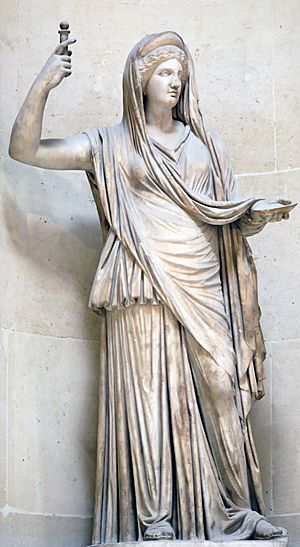
| Events at the Olympics | ||
|---|---|---|
| Olympiad | Year | Event first introduced |
| 1st | 776 BC | Stade (a short foot race) |
| 14th | 724 BC | Diaulos (a double-stade race) |
| 15th | 720 BC | Long distance race (Dolichos) |
| 18th | 708 BC | Pentathlon (five events), Wrestling |
| 23rd | 688 BC | Boxing (pygmachia) |
| 25th | 680 BC | Four-horse chariot race (tethrippon) |
| 33rd | 648 BC | Horse race (keles), Pankration (a mix of boxing and wrestling) |
| 37th | 632 BC | Boys' stade and wrestling |
| 38th | 628 BC | Boys' pentathlon |
| 41st | 616 BC | Boys' boxing |
| 65th | 520 BC | Hoplite race (hoplitodromos, a race in armor) |
| 70th | 500 BC | Mule-cart race (apene) |
| 93rd | 408 BC | Two-horse chariot race (synoris) |
| 96th | 396 BC | Competition for heralds and trumpeters |
| 99th | 384 BC | Tethrippon for horses over one year old |
| 128th | 266 BC | Chariot race for horses over one year old |
| 131st | 256 BC | Race for horses older than one year |
| 145th | 200 BC | Pankration for boys |
The games started with just one foot race. Over time, they grew to include twenty-three different contests. However, no more than twenty events were held at any one Olympics. Most events were only for male athletes. Women could take part by entering horses in the horse racing events.
Events for young boys began in 632 BC. We know how these events were done mostly from paintings of athletes. These paintings are found on many ancient vases.
Ancient vs. Modern Olympic Games
What Was Different?
- The ancient Olympics lasted only 5 days. Modern Olympics last up to 16 days.
- Only free Greek citizens could compete in the ancient games. Enslaved people were not allowed.
- Only men were allowed to compete in most events.
- The ancient Olympics were mainly a religious event to honor the Greek God, Zeus.
- There were no second or third places in the ancient Olympics. Only the first-place winner was honored.
- There were no Winter Olympics back then.
- In the ancient Greek Olympics, athletes ran naked. Today, they wear clothes.
- The ancient games were always held in Olympia. Modern Olympics are held in different countries around the world.
- There were no team sports in the ancient games.
- Ancient games focused on skills useful in combat, like wrestling and chariot racing. Modern Olympics have many different sports like swimming, tennis, and gymnastics.
- The marathon race did not exist in the ancient Olympics.
What Was Similar?
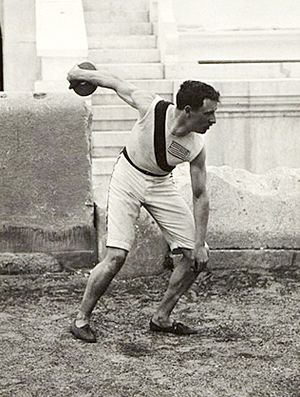
- Both ancient and modern Olympics are held every four years.
- Both are very popular events.
- Both begin with athletes taking an oath. They promise to compete fairly and follow the rules.
- Both have judges to oversee the events.
- Athletes in both eras become very popular, like celebrities.
- Both have opening and closing ceremonies.
- Some events are the same in both the ancient and modern Olympics. These include the pentathlon, javelin, long jump, discus, running races, boxing, some horse riding events, and wrestling.
- Since the 1928 Amsterdam Olympics, the Olympic flame is kept burning. This idea came from the ancient games. A sacred fire was kept burning throughout the ancient Olympics on the altar of Hestia.
- In both ancient and modern games, people did not like athletes who cheated.
Related pages
Images for kids
-
The stone seats reserved for the judges at Olympia. Today, this is where the Olympic flame is passed to the first torchbearer.
See also
 In Spanish: Juegos Olímpicos en la Antigüedad para niños
In Spanish: Juegos Olímpicos en la Antigüedad para niños
 | Mary Eliza Mahoney |
 | Susie King Taylor |
 | Ida Gray |
 | Eliza Ann Grier |


